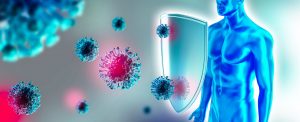The immune system is capable of fighting cancer on its own. The main thing is that on the surface of actively multiplying disease-causing cells there are special molecules that attract cell killers.
Recently, Infox.ru wrote how immune cells (T-lymphocytes) can predict the duration and strength of recurrences of a viral disease – genital herpes. However, the immune system of animals (including humans) is faced not only with infectious diseases. Therefore, it contains special agents that recognize and kill uninfected but suspicious cells.
Distrustful killers
The human immune system consists of a complex set of proteins, cells, tissues and organs that ensure the safety of the body at different stages of interaction with the external environment. Some components protect the body from infections, others from internal failures.
Special attention of scientists is attracted by normal killers (NK from the English natural killer). These large granular lymphocytes kill cells, just like T-lymphocytes (T-killers). But unlike the latter, NK is not so “gullible”. Therefore, they act on infected cells, which, at the molecular level, are “disguised” from T-lymphocytes. In this sense, NK insure immunity, although they do not form immunological memory. NK is also capable of destroying tumor cells. Scientists are confident that knowledge about distrustful killers can significantly change the methods of treating infectious and oncological diseases.
cancer detector
It is assumed that NK find the tumor using the NKG2D receptor, which recognizes numerous complementary sites (ligands) on the surface of actively proliferating diseased cells. The molecular backbones to which NKG2D receptors respond are also present on healthy cells. However, there are especially many of them on the surface of cancer cells. Apparently, they are the ones that attract NK cells. Over the past decade, scientists have found that tumors with a large number of NKG2D receptor ligands die due to excessive killer attack. Blockage and deficiency of the NKG2D receptor, on the other hand, promotes the growth and thriving of various forms of cancer. Presumably, the fate of the tumor depends on the presence of NK in the body, as well as whether there are enough molecular backbones on the surface of cancer cells that will attract their killer attention. Researchers hope that sooner or later knowledge of the cancer detector and destroyer will allow the development of drugs that will either provoke the immune system to a targeted attack or replace it.
Immunity against cancer
Researchers at the Institut Pasteur, led by Jacques Deguine, conducted a series of experiments (in vivo and in vitro) that help to understand the intricacies of the anti-cancer fight of the immune system. In an experiment with mice, scientists tried to grow a subcutaneous tumor. But not some, but one with ligands to the NKG2D receptor present on the cell surface. It turned out that regardless of the amount of oncogenic “sourdough” cancer does not develop. That is, a cell attractive to killers died almost instantly. However, the result is valid only for animals with a full-fledged immune system. In an experiment with mice devoid of all lymphocytes, even single tumor cells began to actively multiply and form a solid tumor in just a few days.

Biologists tried to stop experimental oncogenesis, but came to the conclusion that this can only be done preventively. Thus, NK, introduced into the body of lymphocyte-free mice four days before the injection of tumor cells, completely stopped oncogenesis. On the other hand, the tumor cells, which no one interfered with at the very beginning of the pathogenic path, completely ignored the belated appearance of killers. With such experiments, scientists once again confirmed the assumption that it is NK that resist cancer.
Biologists studied the morphological characteristics of anticancer lymphocytes and came to the conclusion that when they get into a tumor, they “grow up” – they grow significantly, get stronger and become mobile. All this helps NK cells to be more aggressive towards the tumor. The researchers drew attention to how tumor cells and the immune system interact in in vitro experiments. It turned out that NK has helpers – T-lymphocytes. But, unlike them, NK lead a fairly mobile lifestyle, jumping from one cell to another. T-lymphocytes, on the contrary, establish strong bonds, sticking to the tumor cell. Despite a short relationship, NKs have a stronger cytotoxic effect on cancer and literally dissolve the tumor.
The researchers are confident that the results of the experiments, published in the article Intravital Imaging Reveals Distinct Dynamics for Natural Killer and CD8+ T Cellsduring Tumor Regression in the journal Cell, will help to understand anti-cancer immunity https://en.wikipedia.org/wiki/Cancer_immunotherapy and develop fundamentally new targeted drugs that will force the body to fight the disease on its own.